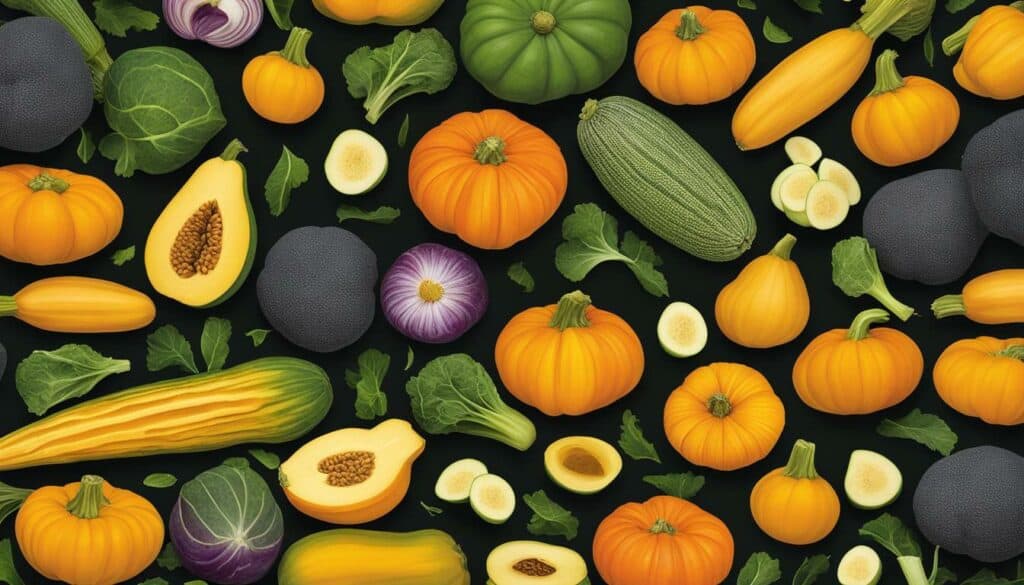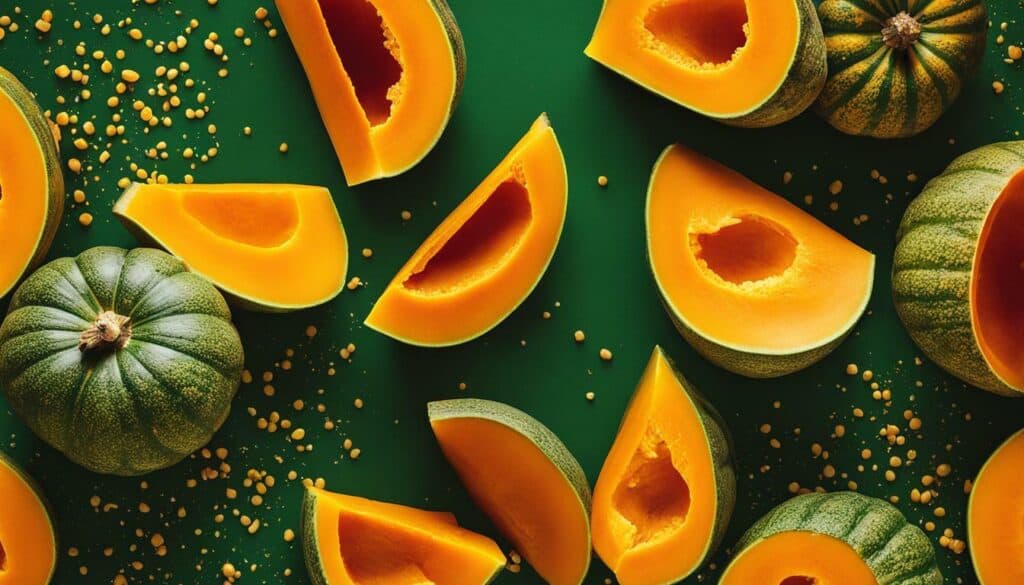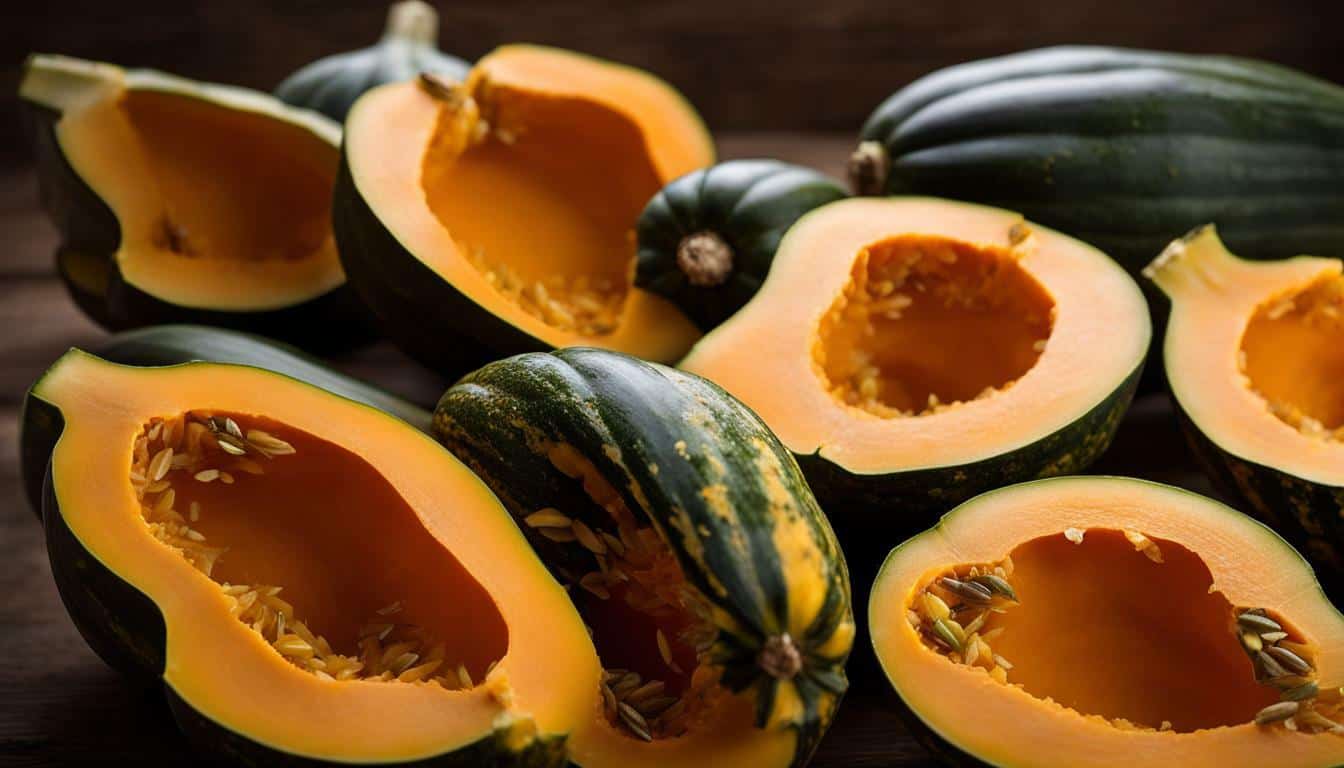Welcome to my guide on buttercup squash nutritional information, where we will explore the nutritious benefits of this tasty veggie and learn how it can be a valuable addition to your balanced diet.
- Buttercup squash is a variety of winter squash that is low in calories and contains no saturated fats or cholesterol.
- It is a good source of dietary fiber, vitamins, and minerals, including vitamin A, vitamin C, potassium, and folate.
- Buttercup squash is gluten-free, making it suitable for individuals with celiac disease or gluten sensitivity.
- It can be prepared in various ways and used as a substitute for other squash varieties in recipes.
- Incorporating buttercup squash into your diet can provide numerous health benefits.
Benefits of Buttercup Squash
Discover the numerous benefits of including buttercup squash in your meals for improved overall health and well-being. This variety of winter squash is not only delicious but also packed with essential nutrients that can support a healthy lifestyle. Let’s explore some of the key benefits:
- Rich in Nutrients: Buttercup squash is a nutritional powerhouse, providing a wide range of vitamins and minerals. It contains high levels of vitamin A, which is essential for eye health, immune function, and maintaining healthy skin. It is also a good source of vitamin C, an antioxidant that helps protect against cellular damage and boosts the immune system.
- Fiber-Rich: Incorporating buttercup squash into your meals can help increase your fiber intake. A single serving of buttercup squash can provide a significant amount of dietary fiber, which promotes healthy digestion, aids in weight management, and helps prevent constipation.
- Heart-Healthy: Buttercup squash is low in calories and contains no saturated fats or cholesterol. It is rich in potassium, a mineral that plays a crucial role in maintaining healthy blood pressure levels. Additionally, the high fiber content in buttercup squash can contribute to lower cholesterol levels and reduce the risk of heart disease.
- Antioxidant Properties: The vibrant orange color of buttercup squash is indicative of its high beta-carotene content. Beta-carotene is a powerful antioxidant that helps protect the body against free radicals, reducing the risk of chronic diseases such as cancer and cardiovascular disorders.
With its nutritional profile and health benefits, buttercup squash can be a valuable addition to your diet. Whether you roast it, puree it, or incorporate it into delicious recipes, you can enjoy its sweet and nutty flavor while reaping the rewards of its nutrient-rich composition.
To give you a better idea of the nutritional content of buttercup squash, here is a table summarizing its key nutrients:
| Nutrient | Amount per 100g | % Daily Value* |
|---|---|---|
| Calories | 78 | 4% |
| Carbohydrates | 20g | 7% |
| Fiber | 4g | 14% |
| Protein | 2g | 4% |
| Fat | 0.2g | 0% |
| Vitamin A | 8,886 IU | 178% |
| Vitamin C | 33mg | 37% |
| Potassium | 437mg | 9% |
| Folate | 23mcg | 6% |
Next, we’ll dive deeper into the specific nutritional composition of buttercup squash and further explore its impact on your diet. Stay tuned!
Buttercup Squash Nutrition Facts
Let’s take a closer look at the key nutritional facts of buttercup squash and how it can contribute to a well-rounded eating plan. Buttercup squash is a variety of winter squash that is packed with essential nutrients. It is low in calories, making it a great choice for those looking to maintain a healthy weight or lose a few pounds. Just one cup of cooked buttercup squash contains approximately 115 calories, making it a satisfying and filling addition to your meals.
Buttercup squash is also a great source of dietary fiber, which is important for digestive health and can help regulate blood sugar levels. One cup of cooked buttercup squash provides about 6 grams of fiber, which is 24% of the recommended daily intake. Fiber not only helps promote feelings of fullness, but it also supports regular bowel movements and can help lower cholesterol levels.
In addition to being low in calories and high in fiber, buttercup squash is rich in vitamins and minerals. It is an excellent source of vitamin A, with one cup of cooked squash providing over 200% of the recommended daily intake. Vitamin A is essential for healthy vision, a strong immune system, and proper cell growth and development. Buttercup squash is also a good source of vitamin C, potassium, and folate, which are important for overall health and wellbeing.
| Nutrient | Amount per 1 cup (205g) |
|---|---|
| Calories | 115 |
| Fiber | 6g |
| Vitamin A | 11,920 IU |
| Vitamin C | 25.8mg |
| Potassium | 895mg |
| Folate | 60mcg |
Including buttercup squash in your diet is not only delicious but also a smart choice for your health. Its nutritional profile makes it a versatile ingredient that can be incorporated into a variety of dishes, from soups and stews to salads and side dishes. So why not give buttercup squash a try and reap its numerous health benefits?

Incorporating buttercup squash into your diet can offer a wide range of health benefits, from supporting immune function to promoting healthy vision. This winter squash variety is packed with essential nutrients that can contribute to overall well-being.
One of the key benefits of buttercup squash is its high vitamin A content. Vitamin A plays a crucial role in maintaining healthy eyesight and supporting the immune system. It also promotes the growth and development of cells and tissues throughout the body. By including buttercup squash in your meals, you can easily boost your intake of this important vitamin.
Additionally, buttercup squash is a good source of vitamin C, which is known for its antioxidant properties. Vitamin C helps protect the body against free radicals, which can cause damage to cells and lead to various health problems. Consuming buttercup squash can help strengthen your immune system and improve your body’s ability to fight off infections and diseases.
Furthermore, buttercup squash contains potassium, a mineral that plays a vital role in maintaining normal blood pressure levels. Potassium helps regulate fluid balance in the body and supports proper muscle and nerve function. Incorporating buttercup squash into your diet can help ensure you’re getting an adequate amount of potassium to support your overall health.

| Nutrient | Amount per 100g |
|---|---|
| Calories | 34 |
| Carbohydrates | 8g |
| Fiber | 1.5g |
| Protein | 1g |
| Fat | 0g |
| Vitamin A | 6,678 IU |
| Vitamin C | 21.3mg |
| Potassium | 296mg |
| Folate | 39mcg |
By including buttercup squash in your meals, you can add a flavorful and nutritious ingredient to your diet. Whether you roast it for a savory side dish or puree it into a creamy soup, the versatility of buttercup squash allows for endless culinary possibilities. Enjoy the health benefits and delicious taste of buttercup squash today!
Buttercup Squash Calories and Macronutrients
Learn about the calorie content and essential macronutrients found in buttercup squash, helping you make informed choices for your dietary needs. When it comes to maintaining a healthy diet, understanding the nutritional composition of the foods you consume is crucial. Buttercup squash is not only delicious but also offers a range of health benefits, making it an excellent addition to your meals.
One of the advantages of buttercup squash is its low calorie content. A 1-cup serving of cooked buttercup squash contains approximately 115 calories, making it a great option for those watching their calorie intake. This nutrient-dense vegetable is also packed with essential macronutrients that support overall health.
Let’s take a closer look at the macronutrients found in buttercup squash:
| Nutrient | Amount per 1 cup (cooked) |
|---|---|
| Carbohydrates | 30 grams |
| Protein | 2 grams |
| Fat | 0 grams |
| Fiber | 6 grams |
As you can see, buttercup squash is primarily composed of carbohydrates, providing a good source of energy. It is also high in dietary fiber, which promotes healthy digestion and helps keep you feeling full and satisfied. Additionally, it contains no fat, making it a nutritious choice for those looking to maintain a balanced diet.
Incorporating buttercup squash into your meals allows you to enjoy a flavorful and versatile vegetable while reaping the nutritional benefits it offers. Whether you roast it, add it to soups or stews, or use it in baking, buttercup squash is a nutritious addition to any diet.
Next, let’s explore the vitamins and minerals present in buttercup squash and how they contribute to your overall well-being.
Buttercup Squash Vitamins and Minerals
Discover the array of vitamins and minerals that buttercup squash boasts, providing essential nutrients for optimal health and vitality. This versatile winter squash variety is packed with a variety of vitamins and minerals that contribute to its numerous health benefits.
One of the standout nutrients in buttercup squash is vitamin A. Just one cup of cooked buttercup squash contains over 400% of the recommended daily intake of vitamin A. This powerful antioxidant is essential for maintaining healthy vision, supporting immune function, and promoting cell growth and development.
In addition to vitamin A, buttercup squash is also rich in vitamin C, which plays a crucial role in collagen production, immune system function, and wound healing. Consuming buttercup squash can help boost your vitamin C intake and support overall health.
| Nutrient | Amount per 1 cup (cooked) |
|---|---|
| Vitamin A | 456% of the RDI |
| Vitamin C | 34% of the RDI |
| Potassium | 22% of the RDI |
| Folate | 16% of the RDI |
| Iron | 15% of the RDI |
| Magnesium | 13% of the RDI |
Moreover, buttercup squash is a great source of potassium, an essential mineral that supports heart health, helps maintain proper fluid balance, and promotes healthy muscle function. It also contains folate, iron, and magnesium, which contribute to various bodily functions, including red blood cell production, energy metabolism, and nerve function.
With its impressive nutritional profile, buttercup squash is not only delicious but also a valuable addition to a well-rounded diet. Whether you enjoy it roasted, steamed, or in flavorful recipes, incorporating buttercup squash into your meals can nourish your body and support overall wellness.

Explore different cooking techniques for buttercup squash and get inspired by mouthwatering recipes that showcase its versatility and flavor. Whether you prefer a savory or sweet dish, buttercup squash can be transformed into a delicious and nutritious meal that everyone will enjoy.
Preparation Methods
There are several ways to prepare buttercup squash, each bringing out its unique taste and texture. Here are a few popular methods:
- Baking: Cut the squash in half, remove the seeds, and place it face down on a baking sheet. Roast in the oven at 400°F for about 45-60 minutes, or until the flesh is tender.
- Roasting: Peel and cube the squash, then toss it with olive oil and your favorite seasonings. Spread the cubes on a baking sheet and roast at 425°F for 25-30 minutes, or until golden brown.
- Steaming: Cut the squash into chunks and steam them until tender. This method preserves the squash’s natural sweetness and is perfect for mashing or pureeing.
- Sautéing: Slice the squash into thin pieces and sauté them in a pan with some butter or olive oil. Add herbs and spices to enhance the flavors.
Recipes
Now, let’s dive into some delectable buttercup squash recipes:
- Buttercup Squash Soup: Simmer roasted buttercup squash with onions, garlic, vegetable broth, and a hint of nutmeg. Puree the mixture until smooth and creamy. Serve hot with a dollop of Greek yogurt and a sprinkle of fresh herbs.
- Buttercup Squash Risotto: Sauté diced buttercup squash with shallots and Arborio rice. Add vegetable broth gradually while stirring constantly until the rice is cooked to perfection. Stir in parmesan cheese and garnish with toasted pine nuts.
- Buttercup Squash and Apple Salad: Toss roasted buttercup squash cubes with mixed greens, sliced apples, toasted pecans, and crumbled feta cheese. Drizzle with a tangy vinaigrette made from apple cider vinegar, olive oil, Dijon mustard, and honey.
- Buttercup Squash Pie: Blend cooked and mashed buttercup squash with eggs, brown sugar, cinnamon, nutmeg, and a splash of vanilla. Pour the mixture into a pre-baked pie crust and bake until set. Serve with a dollop of whipped cream.
With its rich flavor and abundance of nutrients, buttercup squash is a fantastic ingredient to experiment with in the kitchen. Try these recipes or create your own culinary masterpieces with this versatile squash. Get creative, and enjoy the wholesome goodness that buttercup squash brings to your meals.

Discover creative ways to include buttercup squash in your diet and reap the nutritional rewards it has to offer. This versatile winter squash variety can be prepared in various ways, allowing you to enjoy its delicious flavors while also benefiting from its numerous health advantages.
One simple and popular method of cooking buttercup squash is baking. Slicing it in half, removing the seeds, and placing it in the oven until tender can result in a mouthwatering side dish or a flavorful addition to salads and grain bowls. You can also stuff the squash with a mix of your favorite ingredients, such as quinoa, vegetables, and herbs, for a filling and nutritious meal.
If you prefer a quicker cooking method, try roasting or steaming buttercup squash. Roasting it in the oven with a drizzle of olive oil, salt, and spices can bring out its natural sweetness and create a caramelized exterior. Steaming buttercup squash helps retain its vibrant color and preserves its nutrients. Once cooked, you can puree it to make a creamy soup or blend it into a smoothie for a nutrient-packed beverage.
Incorporating buttercup squash into your diet doesn’t have to be limited to savory dishes. You can also use it in sweet recipes such as pies, muffins, and smoothies. Its natural sweetness pairs well with warming spices like cinnamon and nutmeg, making it a delicious addition to your favorite fall-inspired treats.
Table: Buttercup Squash Cooking Methods and Recipes
| Cooking Method | Recipe |
|---|---|
| Baking | Savory Stuffed Buttercup Squash |
| Roasting | Roasted Buttercup Squash with Herbs |
| Steaming | Steamed Buttercup Squash with Garlic Butter |
| Sweet Treats | Buttercup Squash Pie |

By incorporating buttercup squash into your diet, you can add a nutritious and flavorful element to your meals. Its vibrant color and versatile uses make it an excellent choice for both savory and sweet dishes. So, get creative in the kitchen, try out different recipes, and enjoy the health benefits that buttercup squash has to offer!
Conclusion
By now, you’ve unlocked the nutritional information of buttercup squash and understand why it can be a valuable addition to your balanced diet.
Buttercup squash, a variety of winter squash, is not only delicious but also packed with nutrients, making it an excellent choice for promoting overall health and well-being. This versatile vegetable is low in calories, making it a guilt-free option for those looking to maintain or lose weight. Plus, it contains no saturated fats or cholesterol, making it heart-healthy.
In addition to being low in calories and fats, buttercup squash is a good source of dietary fiber. Fiber is essential for maintaining a healthy digestive system and can help keep you feeling full for longer, aiding in weight management. It also provides a wide array of vitamins and minerals, including vitamin A, vitamin C, potassium, and folate.
For those with specific dietary needs, buttercup squash is a gluten-free food, making it a safe and delicious option for individuals with celiac disease or gluten sensitivity. With its sweet and nutty flavor, buttercup squash can be prepared in various ways, such as baking, roasting, steaming, and sautéing, adding a burst of taste and texture to your meals. It can also be used as a substitute for other squash varieties in recipes, providing a unique twist to your favorite dishes.
Overall, incorporating buttercup squash into your diet can provide numerous health benefits. From boosting your immune system with its high vitamin C content to promoting healthy vision with its vitamin A content, this nutrient-rich vegetable is a powerhouse of essential nutrients. So, why not give buttercup squash a try and enjoy its delicious taste and health benefits?
FAQ
Q: What is buttercup squash?
A: Buttercup squash is a variety of winter squash that is rich in nutrients and can be a nutritious addition to a healthy diet.
Q: Is buttercup squash low in calories?
A: Yes, buttercup squash is low in calories, making it a great choice for weight management.
Q: Does buttercup squash contain saturated fats or cholesterol?
A: No, buttercup squash contains no saturated fats or cholesterol, making it a heart-healthy food.
Q: What nutrients does buttercup squash provide?
A: Buttercup squash is a good source of dietary fiber, vitamins (including vitamin A and vitamin C), and minerals (including potassium and folate).
Q: Is buttercup squash gluten-free?
A: Yes, buttercup squash is gluten-free, making it suitable for those with celiac disease or gluten sensitivity.
Q: How can buttercup squash be prepared?
A: Buttercup squash can be prepared in various ways, such as baking, roasting, steaming, and sautéing.
Q: Can buttercup squash be used as a substitute in recipes?
A: Yes, buttercup squash can be used as a substitute for other squash varieties in recipes.
Q: What are the health benefits of incorporating buttercup squash into your diet?
A: Incorporating buttercup squash into your diet can provide numerous health benefits, including improved digestion, boosted immune function, and reduced risk of chronic diseases.
Q: How does buttercup squash contribute to a healthy diet?
A: Buttercup squash is nutrient-dense and offers a range of essential vitamins, minerals, and antioxidants that support overall health and well-being.
What Are the Nutritional Benefits of Egg Drop Soup Compared to Buttercup Squash?
Egg drop soup nutrition information reveals that it is a low-calorie dish packed with essential nutrients. Compared to buttercup squash, egg drop soup offers a significant protein boost and is relatively lower in carbohydrates. With its rich content of vitamins, minerals, and amino acids, this savory soup can be a healthier choice for those seeking a balanced meal.
What Are the Nutritional Benefits of Someburros for Health-Conscious Eaters?
Health-conscious eaters can find someburros nutrition information for health-conscious eaters to be quite appealing. With a focus on fresh, high-quality ingredients, Someburros offers a menu that caters to those seeking healthier options. Packed with essential nutrients, vitamins, and lean proteins, their delicious burritos, tacos, and salsas provide a tasty and nutritious choice for those looking to maintain a balanced diet without compromising flavor.





Leave a Reply